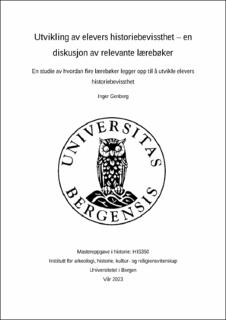| dc.contributor.author | Genberg, Inger | |
| dc.date.accessioned | 2023-06-20T00:22:42Z | |
| dc.date.available | 2023-06-20T00:22:42Z | |
| dc.date.issued | 2023-05-15 | |
| dc.date.submitted | 2023-06-19T22:01:12Z | |
| dc.identifier.uri | https://hdl.handle.net/11250/3072136 | |
| dc.description.abstract | Historiebevissthet – evnen til å se sammenhengen mellom fortid, nåtid og fremtid og klare å plassere seg selv i relasjon til tidsdimensjonene, har i mange år vært en sentral del av norsk og internasjonal historiedidaktikk. Med de siste to læreplanreformene har historiebevissthet fått en vesentlig tydeligere plass både i historiefaget på videregående og samfunnsfaget på ungdomsskolen. Målet med denne oppgaven har vært å kaste lys over hvordan fire utvalgte lærebøker; Kosmos 10, Portal, Relevans 10 og Alle tiders historie, legger opp til å utvikle elevers historiebevissthet. For å oppnå dette har jeg belyst to temaer; historiebevissthet og læreplaner. Historiedidaktikere som Erik Lund, Jan Frode Hatlen, Ketil Knutsen, Lise Kvande, Nils Naastad, Claudia Lenz, Trond Risto og May-Brith Ohman Nielsen, og deres bakgrunn i den angloamerikanske, tyske og dansk-nordiske historiedidaktiske tradisjonen viser et bredt utgangspunkt for utvikling av historiebevissthet. Ved å anvende Wolfgang Marienfeld sin deskriptive-analytiske metode for lærebokanalyse, samt elementer fra gruppeanalyse, har jeg studert hver lærebok og sammenlignet dem. Lærebøkene legger i varierende grad, og på ulike måter opp til å utvikle elevenes historiebevissthet. Kosmos 10, Portal og Alle tiders historie gir uttrykk for et historiebevissthetssyn som har flere likheter med den angloamerikanske tradisjonen enn den dansk-nordiske skolen. Lærebøkene har en tendens til å fokusere på historisk innsikt og metode, istedenfor innsikt i elevene selv. Kosmos 10 og Alle tiders historie inneholder derimot mange elevaktive oppgaver som oppfordrer til refleksjon. Relevans 10 skiller seg fra de andre tre, hovedsakelig fordi den er strukturert tematisk, ikke kronologisk. Elevene må dermed aktivt arbeide med å se sammenhengen mellom tidsdimensjonene. Relevans 10 fokuserer også på elevenes selvdannelse, som er i tråd med den dansk-nordiske historiedidaktikken. Hvordan lærebøkene legger opp til å utvikle elevenes historiebevissthet har en sammenheng med hvilke historiedidaktiske perspektiver de gir uttrykk for, og hvilke læreplaner de representerer. | |
| dc.description.abstract | Historical consciousness - the ability to understand the coherence between the past, present and future and place oneself in the grand scheme of time and place, has for several years played a central part in both Norwegian and international history didactics. Within the last two curriculum reformations, it has been emphasized as an important part of the subject of history and social studies. The goal of this master’s thesis has been to shed light on how four textbooks seek to develop students’ historical consciousness. To do so, I have looked into two different topics: historical consciousness and curriculums. History didacticians such as Erik Lund, Jan Frode Hatlen, Ketil Knutsen, Lise Kvande, Nils Naastad, Claudia Lenz, Trond Risto and May-Brith Ohman Nielsen, as well as their background in Anglo-American, German and Danish history didactics, contribute with different perspectives on the development of historical consciousness. I have studied Kosmos 10, Portal, Relevans 10 and Alle tiders historie while utilizing Wolfgang Marienfeld’s descriptive analytic method for textbook analysis, and compared them by using elements of group analysis. The textbooks vary in their ways of aiming to develop students’ historical consciousness. Both Kosmos 10, Portal and Alle tiders historie portray a view of historical consciousness that aligns more with the Anglo-American tradition than the Danish-Nordic school. The textbooks tend to focus on insight to historical knowledge and methods, rather than insight into the students themselves. Kosmos 10 and Alle tiders historie do however contain student active tasks, which involves the students somewhat in self-reflection. Relevans 10 differs from the other three, mainly because it is structured thematically instead of chronologically. Therefore, the students must actively work in a variety of ways to see the coherence between the past, present and future. Relevans 10 also focus on individual formation, not only education, which is equivalent to the Danish-Nordic tradition. This master’s thesis shows that how the textbooks attempt to develop students’ historical consciousness depends on the tradition of history didactics they portray and the curriculum they represent. | |
| dc.language.iso | nob | |
| dc.publisher | The University of Bergen | |
| dc.rights | Copyright the Author. All rights reserved | |
| dc.subject | historiedidaktikk | |
| dc.subject | lærebøker | |
| dc.subject | historiebevissthet | |
| dc.title | Utvikling av elevers historiebevissthet – en diskusjon av relevante lærebøker | |
| dc.title.alternative | Developing Students’ Historical Consciousness – a Discussion of Relevant Textbooks | |
| dc.type | Master thesis | |
| dc.date.updated | 2023-06-19T22:01:12Z | |
| dc.rights.holder | Copyright the Author. All rights reserved | |
| dc.description.degree | Historie mastergradsoppgave | |
| dc.description.localcode | HIS350 | |
| dc.description.localcode | MAHF-LÆHR | |
| dc.description.localcode | MAHF-HIS | |
| dc.subject.nus | 713107 | |
| fs.subjectcode | HIS350 | |
| fs.unitcode | 11-22-0 | |
